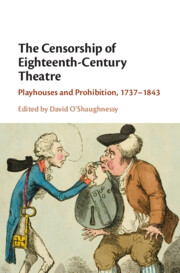Book contents
- The Censorship of Eighteenth-Century Theatre
- The Censorship of Eighteenth-Century Theatre
- Copyright page
- Dedication
- Contents
- Figures
- Contributors
- Acknowledgements
- Abbreviations
- Introduction
- Part I Gender
- Part II Politics
- Part III Performance
- Chapter 7 The Censorship of Personal Satire on the Eighteenth-Century Stage
- Chapter 8 Censoring the Unseen
- Chapter 9 Evading Censorship through Comedy, Improvisation, and Non-verbal Performance in the Early Nineteenth Century
- Chapter 10 Censoring Regency Flash
- Bibliography
- Index
Chapter 8 - Censoring the Unseen
Revolution and the Aesthetics of Theatrical Space
from Part III - Performance
Published online by Cambridge University Press: 03 August 2023
- The Censorship of Eighteenth-Century Theatre
- The Censorship of Eighteenth-Century Theatre
- Copyright page
- Dedication
- Contents
- Figures
- Contributors
- Acknowledgements
- Abbreviations
- Introduction
- Part I Gender
- Part II Politics
- Part III Performance
- Chapter 7 The Censorship of Personal Satire on the Eighteenth-Century Stage
- Chapter 8 Censoring the Unseen
- Chapter 9 Evading Censorship through Comedy, Improvisation, and Non-verbal Performance in the Early Nineteenth Century
- Chapter 10 Censoring Regency Flash
- Bibliography
- Index
Summary
How might attention to the mechanisms of stage licensing help us to think specifically about the politics and aesthetics of on- and off-stage space in eighteenth-century drama? This essay addresses this question by looking at John St. John’s The Island of St. Marguerite, a musical afterpiece first staged at Drury Lane in November 1789. Using a spectacular retelling of the ‘Man in the Iron Mask’ story to mount a barely coded staging of the storming of the Bastille, this play was the first attempt by one of London’s royal playhouses to respond directly to the early events of the French Revolution. But the two Larpent manuscripts for Island show just how much had to be expunged and changed before the examiner of plays would license it. In particular, this essay argues, the cuts and annotations of the examiner (and possibly also John Philip Kemble, Drury Lane’s acting managing) disclose an institutional discomfort with the off-stage spaces – besieged walls, subterranean prison cells, sites of execution – that the audience are never taken to and yet must picture for themselves if what is actually unfolding before them is to make sense. Attention to these manuscripts thus takes us towards a deeper understanding of the play of visibility, of the texture of sensory and extra-sensory experience, in the Georgian theatre.
- Type
- Chapter
- Information
- The Censorship of Eighteenth-Century TheatrePlayhouses and Prohibition, 1737–1843, pp. 174 - 193Publisher: Cambridge University PressPrint publication year: 2023



